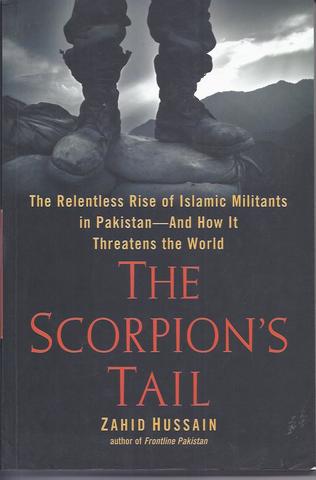The Scorpion's Tail
In The Scorpion's Tail: The Relentless Rise of Islamic Militants in Pakistan-And How It Threatens America, the Wall Street Journal correspondent Zahid Hussain charts a sobering history of the Pakistani state's relationship to Islam, Islamism, and Islamic radicalism. While the radicalist form of Islam -- the kind America really cares about -- didn't take root in Pakistan until the 1980s during the war between Afghanistan and the Soviet Union, it was, Hussain argues, the result of decades of Pakistan's elites politicizing Islam to shore up their rule of the country. Starting with the partition of India and Pakistan in 1947, and moving through the tumultuous history of coups, countercoups, and new constitutions, Hussain walks the reader through Pakistan's steady Islamization.
The question of Islam's place in Pakistan came to a head in the 1980s. This was the decade when Saudi Arabia and the United States teamed up to create a vast, international network of angry, radicalized Islamists eager to take up arms against an infidel enemy, centered in northwest Pakistan. After the Soviet Union withdrew in 1989, many of Pakistan's Islamists turned their attention to Kashmir. It is important, Hussain notes, to realize that Kashmir did not suddenly become a focus of Islamic extremism in the late 1980s, however -- rather, it had been a festering sore inspiring radicalization since 1947. Hussain argues that it is because of Islam's foundational role in Pakistan as a state, along with its utility in agitating over Kashmir, that any Pakistani leader, no matter how determined, has been prevented from effectively countering its influence.
Much like his 2007 book, Frontline Pakistan: The Struggle With Militant Islam, Hussain writes in excruciating detail of the rise of Islamist militants in the 1990s and 2000s. He has excellent access, having worked as a journalist covering the militants for decades. The detail here is nearly overwhelming: example after example of militants behaving violently with impunity, high-ranking generals egging them on, Americans becoming violently frustrated with the lack of action. It is like reading a trainwreck, only on a national scale. Here is laid bare all of Pakistan's embarrassingly close ties to the very militants it now, only half seriously, seeks to oppose: from Prime Ministers Benazir Bhutto and Nawaz Sharif funding the Taliban in the 1990s to Gen. Pervez Musharraf turning a blind eye to the Jalaluddin Haqqani clan in the 2000s.
If Scorpion's Tale has a weakness, it is that the story it tells, which noteworthy for being both svelte --Hussain's prose has wonderful brevity -- and meticulously documented, isn't exactly a secret. It is not the imparting of new reporting here that makes Hussain's work so valuable, however, but rather its scope. As a work of summation, it is outstanding; as a guide for understanding the broadest currents of Pakistani power politics, it is invaluable. More importantly, he lays out, piece by piece, why all this internal deliberation, jostling, and brutality is so terribly important to a United States that seems much more content to plug its ears and wish it away.
By 2008, several Pakistani Taliban groups had formed close alliances with al Qaeda. These allied terror groups then teamed up to execute outrageous acts of brutality across Pakistan, eventually culminating in the suicide bombing of Camp Chapman, a U.S. forward operating military base just over the Pakistani border in Afghanistan's Khost Province, which killed seven Central Intelligence Agency operatives. The United States responded by dramatically ramping up its deadly drone campaign in Pakistan, an action so unpopular that it further destabilized Pakistan's weak civilian government. This provided an opening for the Pakistan military to perpetrate a "creeping coup" and a seizure of power. This political turmoil, Hussain argues, is driving a deepening economic crisis, which helps to exacerbate social and political fracture points throughout Pakistan. "Pakistan has become a powder keg," Hussain explains, "and the fragmentation of the country has become a real possibility."
While there will always be an internationalist element to the dangers posed by rampant Islamic extremism in Pakistan -- failed would-be terrorists like Faisal Shahzad make sure of it -- Hussain argues in a powerful and persuasive way that the real danger posed by these militants is the challenges they pose to the Pakistani government. For the last ten years, the U.S. has relied on the Pakistani government to direct and control the fight against the militants. Hussain cautions that military-only strategies are bound to fail, so that if the Pakistani government splinters, we will lose many of the most effective means of handling the threat of Islamic militarism.
Joshua Foust is a military analyst specializing in Central Asia. He is a contributor to PBS Need to Know, and a contributing editor at Current Intelligence. He is the author of Afghanistan Journal: Selections from Registan.net, available from Just World Books.
There is no reviews yet. Be the first to write us your opinion







